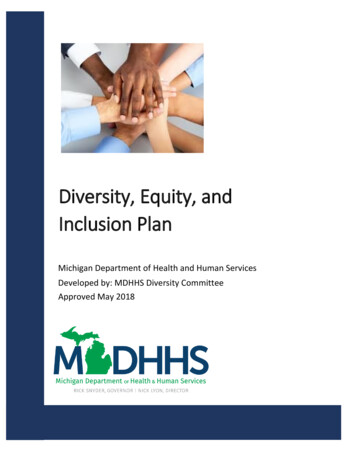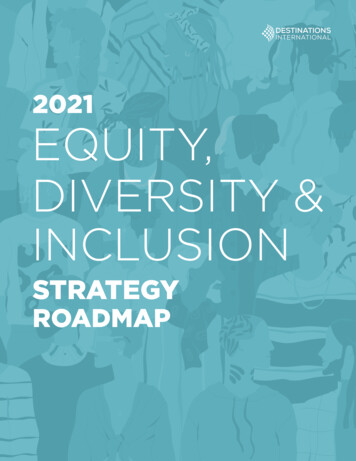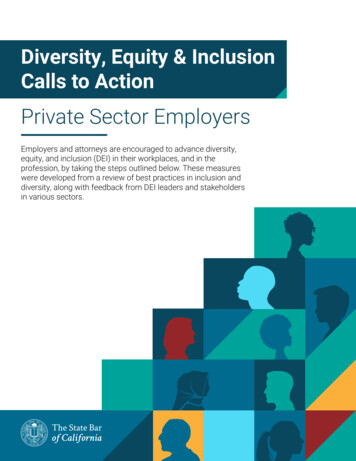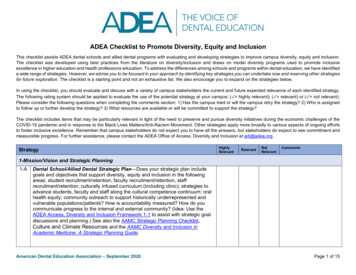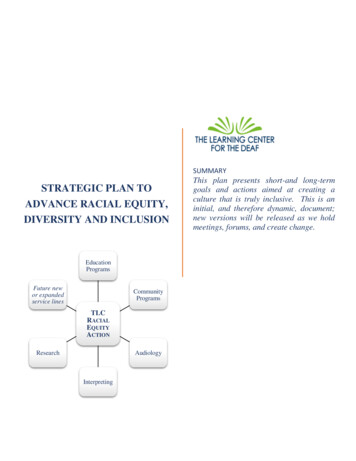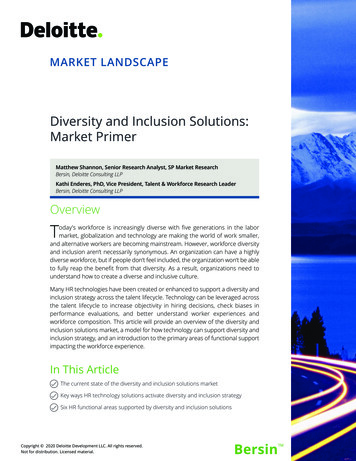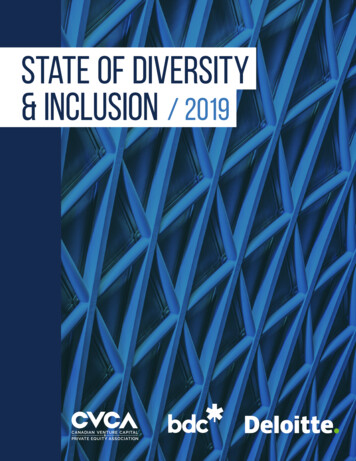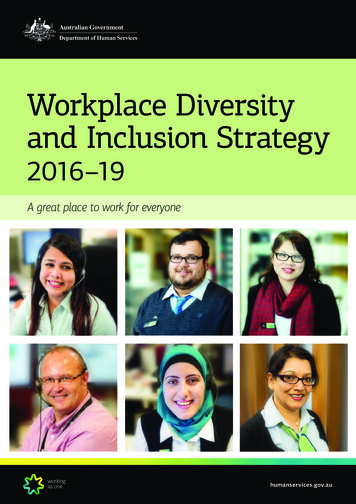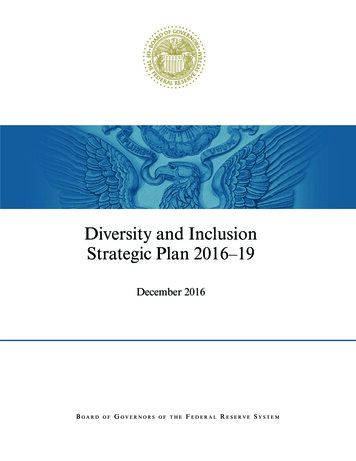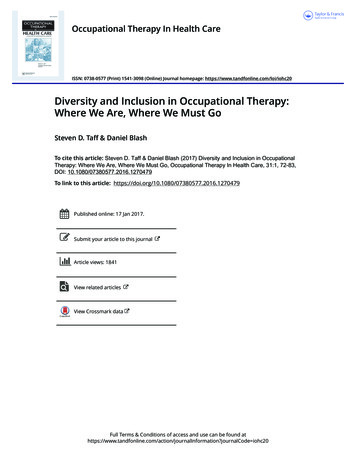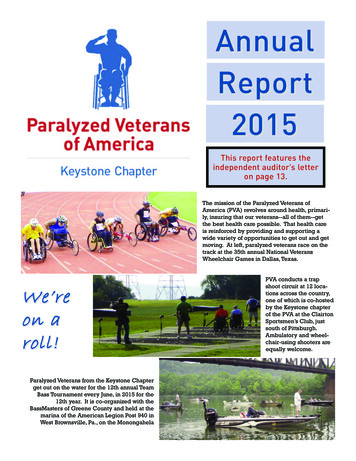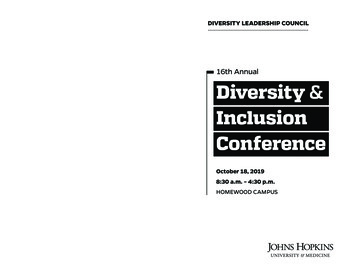
Transcription
DIVERSITY LEADERSHIP COUNCIL1 th AnnualDiversity &InclusionConferenceOctober 1 , 2018:30 a.m. – 4:p.m.HOMEWOOD CAMPUS
PROGRAM7:30 a.m.Check-In/ContinentalBreakfastHodson Hall2nd Floor Lobby8:30 – 10:00a.m.Plenary SessionHodson HallRoom 110Welcome – AshleyLlorens, Chair, DiversityLeadership CouncilPlenary Session – AConversation with KevinSowers10:15 – 11:30a.m.Workshop Session AHodson Hall12:00 – 1:30p.m.Luncheon SessionGlass Pavilion andGreat HallLuncheon Address –Maria Hinojosa1:45 – 3:00p.m.Workshop Session BHodson Hall3:15 – 4:30p.m.Workshop Session CHodson Hall
Plenary SessionKevin W. Sowers, M.S.N., R.N., F.A.A.N.President of the Johns Hopkins Health System and Executive VicePresident of Johns Hopkins MedicineAs the second person in Johns Hopkinshistory to hold these dual roles, Mr.Sowers oversees the health system’s sixhospitals – The Johns Hopkins Hospital,Johns Hopkins Bayview Medical Center,Howard County General Hospital,Suburban Hospital, Sibley MemorialHospital and Johns Hopkins All Children’sHospital – and sets strategies thatadvance our mission to deliveroutstanding care, train the nextgeneration of leaders, and advance research and discovery. Healso serves as chair of Johns Hopkins Community Physicians, whichhas more than 40 primary and specialty care outpatient sitesthroughout Maryland and the Washington, D.C. area.Mr. Sowers came to Johns Hopkins Medicine after 32 years withthe Duke University Health System, the last eight as president andCEO of Duke University Hospital. He joined Duke UniversityMedical Center Hospital in 1985 as a staff nurse in oncology andheld several faculty and nursing leadership positions. His numeroussenior leadership posts across the Duke University Health Systemincluded chief operating officer for Duke University Hospital andinterim CEO for Durham Regional Hospital. Among his senioradministrative roles, Mr. Sowers oversaw consolidation of Duke’sclinical lab services, emergency and trauma services, and managedcare and patient care services.Sowers earned his Bachelor of Science degree from CapitalUniversity School of Nursing and a Master of Science from DukeUniversity School of Nursing. He is an American Academy ofNursing fellow and has collaborated on numerous research effortsas well as consulted internationally. He has published extensivelyand speaks nationally and abroad on issues such as leadership,organizational change, mentorship and cancer care. Mr. Sowerslives in Baltimore with his partner, Anthony Evans.Renata Arrington-Sanders, M.D., M.P.H., Sc.M.(Moderator)Associate Professor, Johns Hopkins University School of MedicineDr. Renata Arrington-Sanders is anAssociate Professor of Pediatrics andInternal Medicine at the Johns HopkinsUniversity School of Medicine. Her areas ofclinical expertise include adolescentsexually transmitted infection and HIV,adolescent transition to adult care, caringfor sexual and gender minority youth, andschool-based health center needs. She hasa joint appointment in the Johns HopkinsBloomberg School of Public Health’sDepartments of Epidemiology and Health, Behavior, and Society.She serves as the Medical Director of the Pediatric and AdolescentHIV/AIDS Program and the Director of the PrEP Program locatedin the Harriet Lane Clinic at Johns Hopkins Children’s Center, andthe Co-Director of the Adolescent and Young Adult ScientificWorking Group Center for AIDS Research (CFAR). Dr. ArringtonSanders earned her M.D. from the University of Virginia School ofMedicine. She completed her residency in internal medicine andpediatrics at the University of Cincinnati and Cincinnati Children’sHospital Medical Centers and fellowship in adolescent medicine atthe Johns Hopkins School of Medicine.
Luncheon SessionWORKSHOP SESSION AA1: Between Black and White: Understanding LatinxEthnoracial IdentityPresenters: Joseph ColónLocation:Hodson Hall, Room 203A2: Unconscious Bias - The Business Case for Diversity andPractical Tools We Can UsePresenters: Minilla Malhotra, MHA, PHR, SHRM-CPLocation:Hodson Hall, Room 210Maria HinojosaNews Correspondent & JournalistMaria Hinojosa is an award-winning news anchor and reporter whocovers America’s untold stories and highlights today’s criticalissues. As the anchor and Executive Producer of the PeabodyAward-winning show Latino USA, and anchor and ExecutiveProducer of the PBS show America By the Numbers with MariaHinojosa, she has informed millions about the changing culturaland political landscape in America and abroad. In April 2010,Hinojosa took a groundbreaking step by creating the Futuro MediaGroup, an independent nonprofit organization producingmultimedia journalism that explores and gives a critical voice to thediversity of the American experience. In nearly 30 years as ajournalist, she has worked for CNN, PBS, CBS, WNBC, and WGBH.Hinojosa has received numerous awards for her work including:four Emmys, the 2012 John Chancellor Award for Excellence inJournalism, Robert F. Kennedy Award for Reporting on theDisadvantaged, the Studs Terkel Community Media Award, andthe Edward R. Murrow Award from the Overseas Press Club.A3: Inciting Revolution through the Power of Women’s AngerPresenters: Nairuti ShastryLocation:Hodson Hall, Room 213A4: LGBTQ Upstander/Allyship TrainingPresenters: Keilah Jacques, MSW; Maneet Kaur, MPH;Brooke Jarrett, MSPHLocation:Hodson Hall, Room 216A5: Knowing Yourself, Valuing OthersPresenters: Demere Woolway, PhDLocation:Hodson Hall, Room 305A6: Honoring Baltimore’s Community: Experiential LearningPreparing Health Professionals to Work with DiversePopulationsPresenters: Phyllis Sharps, PhD, RN, FAAN; Patty Wilson,PhD, PMHNP, RN; Derek Dangerfield II, PhDLocation:Hodson Hall, Room 311
A7: Moving Beyond Mission Statements: Enhancing theRepresentation of Persons with Disabilities at AcademicInstitutionsPresenters: Bonnielin Swenor, PhD, MPH; AaronHodukavich, JD; Cathie Axe, MEd; and TerriMassie-Burrell, PhDLocation:Hodson Hall, Room 313WORKSHOP SESSION BB1: Case Studies & Conversation with the Office ofInstitutional EquityPresenter: The Office of Institutional EquityLocation:Hodson Hall, Room 203B2: A Case Analysis: The Journey to Staff Equity,Advancement and RetentionPresenter: Stacey J. MarksLocation:Hodson Hall, Room 210B3: Johns Hopkins Affinity Groups: Creating Changethrough Grassroots EffortsModerator: Clifton E. Shambry, Jr.Location:Hodson Hall, Room 213B4: Can you believe it!?Presenter: Kathy Schnurr and Rev. Maeba JonasLocation:Hodson Hall, Room 305B5: Neurodiversity 101Presenters: Meredith Nicholson, MSPHLocation:Hodson Hall, Room 311B6: Transgender InclusionPresenters: Sabrina Scarborough and Dariel PeayLocation:Hodson Hall, Room 313WORKSHOP SESSION CC1: Diversifying Physicians in Medicine: Methods for theRecruitment and Retention of URM PhysiciansPresenters: Agnes Usoro, MD and Meron Hirpa, MDLocation:Hodson Hall, Room 203C2: MicroTriggers Presenter: Ivy Planning GroupLocation:Hodson Hall, Room 210C3: Building an Inclusive Culture, One Brain at a TimePresenters: Kristopher BellLocation:Hodson Hall, Room 213C4: Affirming Gender PronounsPresenters: Theodore “Teddy” TinnellLocation:Hodson Hall, Room 305C5: Creating an Inclusive ClassroomPresenters: Mike Reese and Amy BrusiniLocation:Hodson Hall, Room 311
WORKSHOP SESSION AA1: Between Black and White: Understanding LatinxEthnoracial IdentityPresenters: Joseph ColónLocation:Hodson Hall, Room 203Abstract: The categorization of the Latinx community by theU.S. Census has created dynamic levels of confusion and hasdeveloped conversations around race and distinctionsaround ethnicity when discussing this particular community.We address and critique several models of engaging thequestions around categorizations and how we can evolve theconversation around enthnoracism. Where do Latinxcommunities fit within this binary design of a Black and Whitecentric society? The key lies with intersectional approaches torace and ethnicity and understanding Latinx identityorientation that influence these multi-ethnic communities.Joseph Colón has been a student affairs professional for over20 years. Currently, he serves as the Director for the Office ofMulticultural Affairs (OMA). Since arriving to JHU in 2000,Joseph has committed himself to cultivating true partnershipsthat extend throughout the campus community andBaltimore City. He has passion for topics surroundingdiversity, equity and inclusion, organizational development,and the complexities around identity.A2: Unconscious Bias - The Business Case for Diversity andPractical Tools We Can UsePresenters: Minilla Malhotra, MHA, PHR, SHRM-CPLocation:Hodson Hall, Room 210Abstract: Can you articulate the business case need fordiversity and inclusion strategies within your team? Do youhave practical tools to transform the business case on paperinto a reality? In this session, we will share how to do just this.Understanding unconscious bias offers an introspective lookat areas of growth for each of us. But unconscious bias is notintended to shame any of us into joining a cheerful campfiresong. Instead, it can shine a light onto where we can beginindividual diversity and inclusion discussions to make agreater and sustaining impact.Minilla Malhotra, MHA, PHR, SHRM-CP, joined the JohnsHopkins Health System in 2003, to serve in operationsmanagement and human resources. She currently partnerswith the JHHS department of Training and OrganizationalDevelopment and JHU Office of Diversity and Inclusion tooffer training to leaders, staff and students. She serves onthe JHM Diversity and Inclusion Core Team and the JHIDiversity and Inclusion Committee.A3: Inciting Revolution through the Power of Women’s AngerPresenters: Nairuti ShastryLocation:Hodson Hall, Room 213Abstract: Raise your hand if you’ve ever been dismissed as anangry woman. Keep your hand up if you’re totally over it.Drawing on the works of radical women scholars and writerslike Soraya Chemaly, Rebecca Traister, and Brittney Cooper,and the sociology of emotion, we will examine the pulsatingpolitical heartbeat of the women’s movement in the UnitedStates today: anger. In this workshop, women will; (1) explore
the ways in which complex systems of power, privilege, andoppression anger them; (2) redefine anger as a socialemotion and an invaluable political tool in transforming thestatus quo; and (3) practice strategies to develop “angercompetence” (Chemaly 2018) to support their activism.Nairuti Shastry is a queer Desi Woman of Color. She hailsfrom the scorching state Gujarat, India – an immigrant of the1.5 generation – but currently resides in Baltimore City,Maryland. As the Student Leadership and DevelopmentCoordinator at the Johns Hopkins University Center for SocialConcern, she works with undergraduate students to galvanizea lifelong commitment to active citizenship. Throughdesigning civic engagement programming supported bysocial and racial justice pedagogy, Nairuti hopes to emulateFreire’s praxis, bridging the divides among theory, action,and reflection. With a B.A. in Sociology, French andFrancophone Studies, and Public Health from the College ofWilliam & Mary, she is particularly interested in intersectionof anger, womanhood, and restorative justice.A4: LGBTQ Upstander/Allyship TrainingPresenters: Keilah Jacques, MSW; Maneet Kaur, MPH;Brooke Jarrett, MSPHLocation:Hodson Hall, Room 216Abstract: The goal of the LGBTQ Upstander/Allyshiptraining is to build awareness and skills around the livedexperiences of LGBTQ JHU health services students(Schools of Public Health, Nursing, and Medicine). Thetraining begins with a purpose statement and communityagreements on how to engage during the training. Thetraining is followed by a discussion of the ideology ofothering and key terms, and history of the LGBTQ community in the context of health institutions andspecifically at Hopkins. The training is then enacted bypracticing real-world scenarios contributed by students atJHU, and finally ends with a discussion and commitments.Keilah Jacques, MSW is the Assistant Director of AcademicService-Learning for SOURCE. She is Faculty within theBloomberg School of Public Health, Human Behavior andSociety. She advances curricular and co-curricular efforts tofurther social justice and critical consciousness for faculty,community partners, staff, and students at the healthprofessionalschools.Maneet Kaur, MPH is a doctoral student studying cancerepidemiology. She has helped design and facilitate theLGBTQ Upstander/Allyship training since its initiation lastyear. She is also actively engaged on campus through theDoctoral Student Council and the Department ofEpidemiology’s Inclusion, Diversity, Equity, and Science(IDEAS)WorkingGroup.Brooke Jarrett, MSPH is a doctoral student of infectiousdisease epidemiology. She has recently learned to facilitateworkshops to promote diversity and inclusion. She hastrained students, faculty, staff, and now — you!A5: Knowing Yourself, Valuing OthersPresenters: Demere Woolway, PhDLocation:Hodson Hall, Room 305
Abstract: We discuss how race, class, sexual orientation,gender, national origin, ability, religion, and other identitiesshape our campus experience. Participants will also considerhow being aware of one’s own privilege can help one supportothers, both here at Hopkins and in the wider world.Participants will also identify concrete steps that we can taketo build a welcoming educational environment for all.Demere Woolway, PhD is the Director of LGBTQ Life at JohnsHopkins University, and has previously worked at MiamiUniversity in Ohio and Washington State University. In 2014,Demere received a PhD in Student Affairs in HigherEducation from Miami University. Demere is a past co-chairof the Consortium of Higher Education LGBT ResourceProfessionals.A6: Honoring Baltimore’s Community: Experiential LearningPreparing Health Professionals to Work with DiversePopulationsPresenters: Phyllis Sharps, PhD, RN, FAAN; Patty Wilson,PhD, PMHNP, RN; Derek Dangerfield II, PhDLocation:Hodson Hall, Room 311Abstract: The US population has continued to increase indiversity. The health professional workforce has not increasedin diversity at the same rate as the population. Healthprofessionals must be prepared to deliver competent healthcare that is culturally appropriate and with cultural humilityembracing the population diversity. The JHSON’sCommunity Outreach course and program uses socialdeterminants of health framework to provide experientiallearning about diversity by: increasing awareness of thehistory of Baltimore and JHU/JHH, exploring Baltimore’scommunities, and dialogue with Baltimore residents. Thisrequired course is foundational for subsequent clinicallearning activities with diverse populations in Baltimore.Phyllis Sharps, PhD, RN, FAAN, is the Elsie M. LawlerEndowed Chair, Professor of Nursing, and Associate Dean forCommunity Programs and Initiatives at the Johns HopkinsUniversity School of Nursing and has been the PI for two NIHfunded grants totaling more than 8 million, and developeda nurse home visitation program for abused pregnantwomen. Her current research focuses on formerlyincarceratedwomen.Patty R. Wilson, PhD, PMHNP-BC is the Director for theJHSON Center for Community Innovation and Scholarship(CCIAS). She is the Co-PI for the Passport to Freedomprogram which provides sessions to formerly incarceratedwomen promoting self-awareness of trauma and health, andprovides strategies to cope with symptoms of trauma/stress.Derek Dangerfield II, PhD conducts research on HIV/STIs andsexual health for men (MSM) using complex mixed methodsand community based participatory approaches. He hasreceived funding from the JHU Center for AIDS Research. Heis leading two qualitative studies in Baltimore and LosAngeles exploring opioid use and HIV treatment amongBlack MSM.A7: Moving Beyond Mission Statements: Enhancing theRepresentation of Persons with Disabilities at AcademicInstitutions
Presenters:Location:Bonnielin Swenor, PhD, MPH; AaronHodukavich, JD; Cathie Axe, MEd; and TerriMassie-Burrell, PhDHodson Hall, Room 313Abstract: Over the past decade, academic institutions haveembraced the importance of diversity and inclusion inresponse to concerns about the representation of certaingroups, including women and racial and ethnic minorities. Yetpeople with all categories of disability remainunderrepresented in this setting. This session aims to changethe paradigm of disability at JHU by examining how thesedynamics play out at Hopkins and how everyone can play arole in increasing disability access and inclusion.Opportunities to break down barriers to disclosure, actionand change will be explored.Aaron J. Hodukavich, JD joined the Office of InstitutionalEquity in February 2018. Aaron is a licensed attorney in thestate of Oregon, where he practiced education law andadvised clients in ADA and IDEA matters. Prior to joiningJHU, Aaron served as Director and ADA/503/504Coordinator at Syracuse University. There, he was an activemember of several institutional committees, including theUniversity Council on Diversity and Inclusion and the SUPolicy Advisory Committee. Aaron holds a B.S. fromLongwood University and a J.D. from the Howard UniversitySchool of Law.Bonnielin K. Swenor, PhD, MPH, is an Assistant Professor atthe Wilmer Eye Institute at Johns Hopkins University Schoolof Medicine and in the Department of Epidemiology at theJohns Hopkins Bloomberg School of Public Health, as well asa Core Faculty Member at the Johns Hopkins Center onAging and Health (COAH). Her research examines theinterrelationship between vision loss and aging, whichincludes determining how visual impairment and eye diseaseaffect physical, cognitive, psychological and socialfunctioning, as well as health outcomes, such as mortality,comorbidity, and frailty. Dr. Swenor’s research interests stemfrom her personal experience living with visual impairment.She is committed to improving the representation of personswith disabilities in science and medicine, and has expertiseon strategies to enhance inclusion, recruitment andrepresentation of persons with disabilities in these settings.Cathie Axe, MEd currently partners with university-widedisability coordinators and staff in the diversity and inclusionunits to build awareness, knowledge, and skills related todisability. At Brown University, Cathie developed acomprehensive diversity and inclusion plan for AccessibilityServices, including analyzing the effectiveness of servicedelivery across diverse groups.Terri Massie-Burrell’s role involves building connections withstaff and faculty to create accessible and inclusiveenvironments. Massie-Burrell brings over 25 years ofexperience in higher education as both administrator andfaculty member at a variety of institutional types serving as aleader in student success.
WORKSHOP SESSION BB1: Case Studies & Conversation with the Office ofInstitutional EquityPresenter: Joy Gaslevic, JD; Linda Boyd, JD; andmembers of the Office of Institutional EquityLocation:Hodson Hall, Room 203Abstract: In this interactive workshop you will evaluatehypothetical case studies as part of small group exercises.Presenters will provide general information about how thesenuanced problems are approached from the perspective ofan investigator, the applicable policy standards, and availableresources. Through these case studies, you will learn abouthow internal offices for equity approach complaints aboutdiscrimination, harassment, sexual misconduct, andretaliation; participate in a discussion about what happenswhen a concern about discrimination or harassment isreported; and consider why responding to these concerns isrelevant to the health of an organization and pertinent to ournational discourse.Joy Gaslevic, JD, joined JHU in June 2016 after nine years inthe Educational Affairs Division of the Maryland AttorneyGeneral’s Office. There, Joy represented University ofMaryland System schools and was considered an expert onTitle IX issues. Joy graduated magna cum laude from theUniversityofBaltimoreLawSchool.Linda Boyd, JD, joined OIE in March 2015 as an Investigatorand assumed her current role in December 2016. Previously,Linda practiced at an employment law firm and the SocialSecurity Administration, where she litigated claims ofdiscrimination and harassment. Linda graduated cum laudefrom the Duke University School of Law.B2: A Case Analysis: The Journey to Staff Equity,Advancement and RetentionPresenter: Stacey J. MarksLocation:Hodson Hall, Room 210Abstract: This workshop will provide a case analysis andexplore the journey of ensuring staff access and inclusionacross the institution. Facilitators will provide an overview ofrecommendations to leadership from the DiversityLeadership Council’s Staff Access and Inclusionsubcommittee. These recommendations seek to increaseequity and access, provide accountability and understand theneeds for staff advancement and retention. This workshopwill also explore the collaborative efforts that led to therelease of the 2019 JHU Staff Composition Report.Facilitators will use the JH Diversity Roadmap (Staff section)as a marker to develop action plans to address gaps and setgoals. This interactive workshop will empower staff totransform thoughts or assumptions into action, leading tochanges in institutional strategies and policies.Stacey Marks is the Academic Program Manager in theSchool of Medicine – Institute for Clinical and TranslationalResearch. She is a current member on the DiversityLeadership Council (DLC) and serves as the SubcommitteeChair for the Staff Access and Inclusion Committee. Afterhigh school, she joined the U.S. Army and then completedher BS Degree at the University of Maryland Baltimore
County. She then earned her MS Degree in OrganizationalDevelopment and Strategic Human Resources and pursedthe Certificate for Leadership Development Program forMinority Mangers at Johns Hopkins University Carey BusinessSchool.Kendall Free is a senior studying Material Science andengineering. She serves as president of both theMulticultural Leadership Council and the Black StudentUnion as well as a member of Sigma Gamma Rho Sorority,Incorporated. She hopes to be a doctor.B3: Johns Hopkins Affinity Groups: Creating Changethrough Grassroots EffortsPresenters: Sabrina Epstein, Kendall Free, Wilson Lamy,Liz A. Skerritt, Clifton E. Shambry, and CalvinL. SmithLocation:Hodson Hall, Room 213Wilson Lamy is a Senior Quality Innovation Coach andCertified Lean Sigma Master Black Belt for Johns HopkinsMedicine in the Armstrong Institute for Patient Safety andQuality. For 20 years, Wilson has led Hispanic/Latinoorganizations and most recently is the co-chair of HopkinsFamilia Hispanic/Latinx ERG within JHM.Abstract: Panelists of affinity groups at Johns Hopkins sharetheir experiences as change agents in their communities.Through a panel of faculty, staff and student leaders of affinitygroups, experiences as change agents in their communitieswill be discussed on the below topics:Liz A. Skerritt is a project manager at the Applied Physics Labwith a B.S. and M.S. from Johns Hopkins University. Liz servesas the president of Allies in the Workplace, APL’s LGBTQ Affinity Group and the cofounder of APL’s Employee AffinityGroup Executive Representatives (EAGER). Importance to bring the community together The establishment and continuation of communitybuilding Effectiveness of the organization Changes occurring due to the work of the affinity group What work still needs to be done to make a more justand inclusive worldClifton E. Shambry Jr. is the Assistant Director of StudentOrganizations in Homewood Student Affairs. He also servesas a member of the Black Faculty and Staff Association, theProfessional Men of Color Hopkins Alliance, and the DiversityLeadership Council, and he advocates for identity-basedstudent organizations.Sabrina Epstein is a junior studying Public Health and VisualArts. This is her third year on the Advocates for DisabilityAwareness (ADA) board, and she currently serves as theorganization's Vice President. She hopes to pursue a careerin disability advocacy.Calvin L. Smith Jr. serves as the Director of StudentLeadership and Involvement on the Homewood campus aswell as the President Elect of the Black Faculty and StaffAssociation, Coordinator of the Professional Men of ColorHopkins Alliance and a member of Kappa Alpha PsiFraternity, Incorporated.
B4: Can you believe it!?Presenter: Kathy Schnurr, Rev. Maeba JonasLocation:Hodson Hall, Room 305Abstract: Join the Chaplains in an interactive workshop aboutengaging one another in a religiously pluralisticenvironment. We will explore tools for expanding ourunderstanding of one another and approaches toward reshaping our assumptions. Attendees will be asked toparticipate in guided conversations with one another. Wewelcome people of any or no religious or spiritual path to joinus in this interfaith exercise.Kathy Schnurr has served in the chaplaincy of JHU Religiousand Spiritual Life since 2002. She is a Protestant Christian laywoman with over 17 years of experience in higher education.Kathy’s committed to creating a campus environment thatengenders the flourishing of the fullness of human dignity forall.Rev. Maeba Jonas is an Ordained Minister in the UnitedChurch of Christ (UCC) and has served as the AssistantChaplain at Johns Hopkins University since 2017. Sheearned a Master of Divinity from Yale Divinity School with acertificate in Education, Leadership and Ministry. Rev.Jonas is passionate about supporting people of all faith, andnon-faith backgrounds, and is committed to promoting socialjustice, interfaith dialogue, and the mind-body-spiritconnection.B5: Neurodiversity 101Presenters: Meredith NicholsonLocation:Hodson Hall, Room 311Abstract: The concept of neurodiversity originates amongautistic self-advocates and recognizes that differences inbrain function are natural variations to be embraced insteadof shunned. Many of us know and/or work with individualswho are autistic or otherwise neurodiverse (ex. ADD/ADHD,dyslexia, sensory processing disorder) yet they are often leftout of inclusion efforts. Join us for a workshop which breaksdown what neurodiversity truly means and how your socialjustice efforts can be inclusive of this community. Thisworkshop will take an intersectional approach regarding howthe ableism which neurodiverse people face interacts withrace, gender, sexuality, and more.Meredith Nicholson, MSPH is an autistic self-advocate andMSPH graduate of the Bloomberg School of Public Health,where she wrote a master’s essay on the needs of LGBTQautistics. The essay won the Population, Family, andReproductive Health Department's Master’s Essay DistinctionAward. Meredith is a former Wendy Klag Center intern whereshe researched the impact of age of autism diagnosis onhealth outcomes.B6: Transgender InclusionPresenters: Sabrina Scarborough and Dariel PeayLocation:Hodson Hall, Room 313Abstract: The presentation gives an overview of transgenderissues that limit inclusivity in society and the workplace. Itstarts with an introduction to key terms and definitions thatare necessary to have a foundation of knowledge andunderstanding. Transgender health, business, legal, and
government inequities and discrimination will be highlighted.The focus then turns to attitudes and behaviors that allies ofthe transgender community can adopt, particularly in theworkplace, to insure a safe space and workplace inclusivity fortransgender individuals.Sabrina Scarborough is the Campus Operations Manager forthe JHU School of Nursing. She has been with JHU since1997. She received her degree in Criminal Justice andEmergency Management and is currently taking classes in theMaster of Liberal Arts from the JHU Advanced AcademicsProgram. Sabrina facilitates Safe Zone and TransgenderAwareness trainings for Johns Hopkins and received a 2016Diversity Recognition Award from the Johns HopkinsDiversity Leadership Council.Dariel Peay is the Supervisor for the Johns Hopkins HealthSystem’s Patient Access Services Department ofDermatology. She has been with Johns Hopkins HealthSystem since 2007. She has a degree in Network SystemsAdministration and is pursuing her bachelor’s in cybersecurity. Dariel is a dedicated transgender activist. Inaddition, she is a facilitator for the Johns Hopkins Safe Zonetraining and the secretary for The Hopkins Network.WORKSHOP SESSION CC1: Diversifying Physicians in Medicine: Methods for theRecruitment and Retention of URM PhysiciansPresenters: Agnes Usoro, MD and Meron Hirpa, MDLocation:Hodson Hall, Room 203Abstract: In 2010, under-represented in medicine (URM)individuals accounted for 22.4% of the US population, yetonly 12.3% of practicing physicians. But it's derserved patients, improve when they are cared for byminority physicians. Therefore, it is imperative to invest incultivating a medical workforce with demographics thatrepresent the population. We will present a methodology foraddressing diversity and inclusion efforts at various levels ofphysician development and training.Agnes Usoro, MD, was the first Vice-Chair of the House StaffDiversity Council, an inaugural committee of the House StaffCouncil, which is a self-governing and representative body ofthe interns and residents of the Johns Hopkins Hospital andJohns Hopkins Bayview Medical Center. She formed theDiversity Council and established the infrastructure of thecouncil into micro-community affinity groups. The council hasbeen successful in establishing networks within the largerJohns Hopkins Medicine community and is tasked tochampion D&I goals at various levels of the institution.Meron Hirpa, MD is a third year resident physician at theJohns Hopkins Osler Internal Medicine-Urban Health PrimaryCare Leadership Program. She received her BA inNeuroscience from Amherst College and her MD fromUniversity of Florida College of
the Duke University Health System, the last eight as president and CEO of Duke University Hospital. He joined Duke University Medical Center Hospital in 1985 as a staff nurse in oncology and held several faculty and nursing leadership positions. His numerous senior leadership posts across the Duke University Health System
